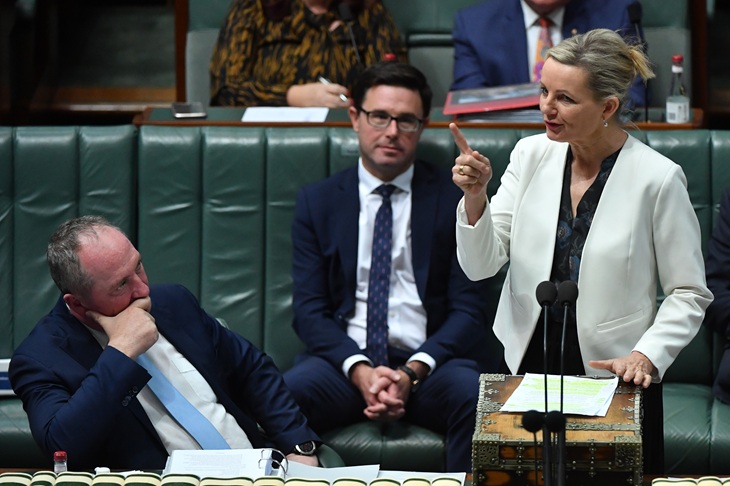I’ve spent an interesting few weeks in Australia meeting figures from across the right of politics. I also spoke with dozens of everyday Australians about their views on politics and the future of the country. I can’t claim to be an expert on Australian politics, and I was very much in learning mode, but after my time there, I couldn’t help forming a few impressions about the current political mood.
There’s clearly a real nervousness within the Liberal-National Coalition about what’s happening elsewhere in the world, particularly in the UK with the rise of Reform UK. In fact, it was reported in The Spectator (UK edition) only last week that a number of former Australian politicians are currently in Britain trying to help the Conservative Party in its battle for survival. They’re acutely aware of the ramifications for the Liberal-National Coalition – particularly the Liberal Party – if the Conservatives are effectively replaced by Reform UK on the right of British politics. And they’re right to be.
A number of figures on the right of the Coalition are keen to take corrective action to ensure they aren’t cannibalised by a populist force in the same way the British Conservatives are. Yet, like their UK counterparts, the Liberal Party seems split down the middle about how to respond to the global right-wing realignment. For every Liberal figure who believes they should prioritise conservative voters, there’s another obsessed with chasing Teal-leaning voters.
My sense on arrival was that the political forces shaping the West are largely global, and that Australia won’t be immune. I struggle to think of a single major centre-right political party in a Western democracy right now that is securing electoral success by embracing centrism or the mushy middle ground. Voters increasingly want political parties that stand for something and adopt clear positions and avoid trying to split the difference the whole time.
Many in Australia seem to believe they’ll be spared the political upheavals seen elsewhere – that their electoral system, political culture, economy and geography will shield them from a Reform UK, a Trump, a Le Pen, or an AfD. I imagine these people know their own country and its politics far better than I do, so I’m not about to lecture them. Still, I’ve always been struck by how, in the UK, even people who’ve spent their whole lives in the country can be strangely detached from how voters actually experience politics and what they’re really thinking. My sense, having just returned from Australia, is that the same complacency exists there too – and that the global forces now reshaping politics elsewhere will, in time, make themselves felt there as well.
One Nation have clearly been rising in the polls, roughly doubling their support since the last federal election. That’s notable. So far, much of their growth appears to have come at the expense of the Coalition, but that could change. Some argue that preferential and compulsory voting will stop One Nation in its tracks. I understand the logic, but I remember when people insisted that Britain’s first-past-the-post system made it impossible for a party like Reform UK to break through. Look how that’s going now.
Others say Australia’s highly urbanised population will make it harder for so-called ‘populist’ forces to gain traction. Again, I’m not so sure. I was struck by how the Labor Party still seems to hold many blue-collar urban areas – the sort of ‘red wall’ seats that fell to Boris Johnson in 2019 and where Reform UK is now surging. Most of these electorates remain Labor strongholds. As the former MP for Ipswich in the UK, I felt compelled to visit Ipswich, Queensland. It felt remarkably similar to Ipswich back home – yet unlike its British namesake, it’s still firmly Labor territory, with the Coalition unable to gain a foothold. Many would argue that a buoyant One Nation could. It’s worth remembering this was the place Pauline Hanson hails from and where she first won a federal seat in the 1990s, having fallen out with the Liberal Party but still appearing on the ballot under its banner.
Unlike the UK Conservatives, who largely fell flat when it came to tackling illegal migration, the Coalition government did act decisively during its own small-boats crisis and is generally seen as having stemmed the flow. But on legal migration, the numbers in recent years – including towards the end of the Coalition’s time in office – were extremely high. The growing ‘March for Australia’ movement, protesting against uncontrolled mass migration, reflects a growing unease. The Albanese government’s decision to establish a dedicated visa scheme for people from Gaza has also raised eyebrows – Australia is virtually unique among Western nations in doing so. Not even the UK has gone that far.
I recognise the differences between Australia and the UK. But sections of the liberal establishment are entirely wrong to be as complacent as they appear. Many Australians are already noticing how mass migration is changing their country – and they don’t like it. If the Coalition fails to give those voters a voice, they’ll find another outlet. They can see the way in which established politics has been upended in other countries.
The Voice referendum, which shocked the liberal establishment, showed there is a majority for a common-sense conservative approach to Australian politics – a coalition of voters that cuts across class and geography. My instinct, based on the people I met and the mood I sensed, is that this will in time translate into electoral results at state and federal level. And the main driver, as so often, will be mass migration and an elite that seems increasingly detached and complacent.
Tom Hunt is a former UK MP

